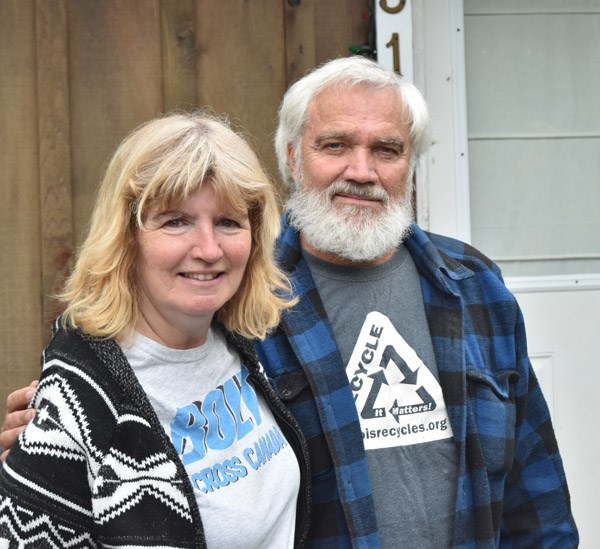The former owners of Gibsons Recycling Depot kicked off retirement in 2017 by driving across Canada in an electric vehicle, armed with a small electric composter to prove such a waste-free trip is possible.
With that odyssey in the rear-view mirror, the pair have embarked on a journey to prove that another common – and commonly wasteful – pursuit can get the zero-waste treatment.
“Though we were able to do some amazing, way-outside-the-box things at Gibsons Recycling Depot, the tiny home from used materials we collected at the depot wasn't one of the things we were able to pull off before we sold last year,” Buddy Boyd told Coast Reporter.
Buddy and his wife, Barb Hetherington, have partnered with Ted Allsopp, owner of Hummingbird Micro Homes, the company behind B.C.’s first tiny home development, to build a zero-waste tiny home.
Zero waste means all materials – from the studs to the windows to the trailer – will be salvaged.
Design plans are underway, and the project is expected to reach completion next year. “It’s going to take awhile because we’ll need a list of everything we need to find,” said Allsopp.
Materials will be mined from the waste stream, a critical element of the project, according to Boyd, since the idea is to prove such homes can be built inexpensively. “There’ll be lots of phone calling, running around, snooping and overturning every rock,” said Boyd.
For now, the search is on for a road-safe trailer base for the structure.
Hummingbird Micro Homes will own the home, while Buddy and Barb will lend their expertise to the project, given their careers in the recycling industry. They also sit on the board of Zero Waste Canada and Barb is a board member of Zero Waste International Alliance.
Once complete, the home may be stationed at an RV site as a demonstration unit, which could also be towed to schools, home shows and other events.
“It is really important to show what is possible,” said Barb of their focus on doing, rather than simply lobbying politicians for stricter policies on waste, which they also do through their work with Zero Waste Canada. “Government moves really slowly,” she said. “People need to change their behaviours and recognize that wants and needs aren’t necessarily the same, and we have to live with less.”
In the meantime, the couple is working with Allsopp on a more personal project, to build their low-waste tiny retirement home at Cedars RV Resort near Malakwa, about 600 kilometres northeast of the Sunshine Coast.
They chose the location because it is outfitted with a DC Fast Charger, for their electric vehicle, and because of its relative proximity to Calgary, where their family lives.
Living rural was also a political choice. “If we’re willing to compromise and think outside the box, maybe we can get out of these apartments and rethink and retool how we’re going to live more affordably, with less, on a smaller footprint,” said Barb.
The high-efficiency 300-sq.-foot home is being built with new and used materials. The on-grid home will be heated with electricity with backup propane. Studs will be thicker to improve insulation and windows are triple glazed. LED lights will be installed and the bathroom uses a sink-toilet combination unit that uses wastewater from the sink for the toilet’s cistern, among other energy and waste-saving customizations.
The home will also have a few – used of course – luxuries. A chunk of their floor will come from Vancouver’s the Commodore Ballroom’s original floor.



